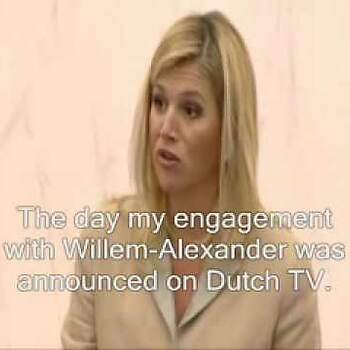Prince Claus
On the 30th of March 2001, the engagement of Prince Willem-Alexander and Máxima Zorreguieta was announced on national television. Following Queen Beatrix's announcement, Prince Claus had the opportunity to address the audience as well. In addition to offering advice to the new couple, he made the following statement [translated]:
“One question that remains difficult to answer and that I have repeatedly been asked, is how it feels to be Dutch. My answer is that I do not know how it feels to be Dutch. I have various loyalties and I am a global citizen and a European and a Dutchman.” (See the video above).
Princess Maxima
In 2007 Princess Maxima delivered a speech at the presentation of the WRR-report 'Identification with the Netherlands' in the Hague (see the video above). She shared her personal journey of searching for the ‘Dutch identity,’ which began approximately seven years prior to this speech. Princess Maxima expressed her struggle in finding a singular 'Dutch person,' stating that ‘the Dutch person does not exist’, similarly she found that ‘the Argentinian’ also does not exist. During this speech, she then referenced the words spoken by her father-in-law at the announcement of her engagement, emphasising how these words have stayed with her. She added [translated]:
“Around the identity and loyalty of a human no fences can be placed. I think a lot of people feel this way.”
Her speech was not without controversy. Geert Wilders, leader of the PVV political party (opposing non-Western immigration), called her words ‘politiek correcte prietpraat’ (politically correct nonsense). Other prominent Dutch figures, including publicist Paul Scheffer, former prime minister Ruud Lubbers (CDA), and VVD parliamentarian Rita Verdonk, countered by affirming the existence of the Dutch identity. A poll conducted by the Radio 1 programme, stand.nl, revealed that nearly two-thirds of Dutch citizens did not agree with Princess Maxima’s statement. These responses indicated that the sentiment shared by her and her father-in-law was not universally shared in Dutch society. The idea of Dutch identity and global citizenship proved to be contentious.
In response to negative reactions to Maxima’s speech about the Dutch identity, she remarked that she admired space for diversity in Dutch society, and that despite all the differences between people, people still envision themselves as Dutch.
In 2009, Princess Maxima became the first UN Secretary-General’s Special Advocate (UNSGSA) for Inclusive Finance for Development. In her new role, as UNSGSA, she began to promote the access and usage of effective, affordable, and responsible financial services, with the goal to positively affect peoples’ lives. Read more about this role here.
Queen Beatrix
In Queen Beatrix’s Christmas speech to the country in 2009, she talked about the changing times and how it affected the Netherlands and its people. See a quote below [translated]:
“In this time of globalisation speeds have increased and distances reduced. Technological development and individualisation have made the human more independent and more distant. We have become more and more dependent on ourselves. Still, a place where we feel at home, where we can feel trust in the people around us and can count on solidarity, remains important as ever. It could be the biggest challenge to figure out how to connect and re-establish trust between the individual and community. The crisis of today is teaching us this too.”
These statements show the concern of certain individuals within the royal family regarding citizenship, occasionally extending to the global dimension of citizenship. Such instances serve as a reminder that the concept of global citizenship in a rapidly globalising world is not without its controversies.
Sources:
Tubantia article on the reception of Maxima’s speech
Article in the Nederlands Dagblad on the reception of Maxima’s speech


